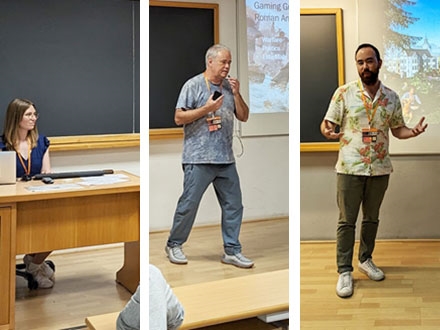
As part of the "Mediterranean 360" project, after visiting the University of Manouba (Tunis), WLLC Professors David Fredrick (Classics; World Languages, Literatures, and Cultures), Curtis Maughan (Digital Humanities) and graduate student researcher Rachel Murray (Comparative Literatures and Cultural Studies) traveled to the University of Seville in Seville, Spain, to present at the 20th Annual International Conference of the Digital Interactive Games Research Association (DiGRA).
The theme of this year's DiGRA conference was "Limits and Margins of Games," which encouraged presentations and workshops that tackled a range of topics, including underground and countercultural game-making, the consolidation of VR as a gaming platform, the decentralization of player communities, the interlacing between games and politics, and the changes in digital culture caused by the COVID-19 pandemic, among others.
Fredrick and Murray co-presented on the topic of "Dirty Pretty Romans: Teaching Catullus as Interactive Fiction Using Twine and StoryMaps'' as part of a panel titled "Learning Through Games." Fredrick and Murray focused on how the Catullus course situated translation of the Latin poems in the context of an interactive fiction (IF) created by the students, based on an ancient Roman dinner party. Through their choices during the dinner conversation, players develop a persona that receives a poem of praise or blame from Catullus at the conclusion of the IF. The Roman social institutions and places that arise during the course of the dinner party are illustrated through ArcGIS storymaps created by the students and linked to the appropriate moments in the IF. Fredrick and Murray discussed their construction of the course as an example of discursive game design, a High-Impact Practice (HIP) through which students learn content by actively engaging with it through collaborative, open-ended game making.
Maughan (director, World Languages and Digital Humanities Studio) held a talk with the title, "From the Walking Sim to the Open World and Beyond: Walter Benjamin's Flânerie in the Age of the Metaverse," as part of a panel called "Traversing Space." Maughan's presentation applies the theories of German philosopher Walter Benjamin to contemporary developments in gaming culture, especially the liminal reaches of interactivity in open world and walking simulator videogames. Drawing from his spring 2023 course on the Metaverse, Maughan addressed the fundamental shortcomings of crypto-based metaversal ventures such as Decentraland, while exploring the educational potential for 3D online environments.
Topics
Contacts
Cheyenne Roy, assistant director
World Languages and Digital Humanities Studio
479-575-4159, ceroy@uark.edu